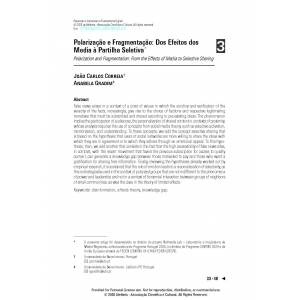Adorno T. W., Frenkel-Brunswik, E., Levinson, D. & Nevitt Sanford, R. (1950). The authoritarian personality. New York: Harper & Brothers.
AVAAZ (2019). Far Right Networks of Deception Avaaz Report. Consultado em https://secure.avaaz.org/campaign/en/disinfo_network_report/
Bentham, J. (2008). O panóptico. Belo Horizonte: Autêntica Editora.
Brennen, S., Simon, J., Howard, P. & Nielsen, R. (2020). Types, sources, and claims of COVID-19 misinformation. Consultado em: https://reutersinstitute. politics.ox.ac.uk/types-sources-and-claims-covid-19-misinformation.
Ceron, A. & Adda, G. (2016). E-campaigning on Twitter: The effectiveness of distributive promises and negative campaign in the 2013 Italian election. New Media & Society,18 (9), 1935-1955.
Canovan, M. (2012). Taking politics to the people: Populism as the ideology of democracy. In Y. Mény & Y. Surel (eds.), Democracies and the populist challenge. (pp. 22-44). Basingstoke: Palgrave.
Correia, J. C, Jerónimo, P. & Gradim, A. (2019). Fake news: emoção, crença e razão na partilha seletiva em contextos de proximidade. Brazilian Journalism Research. Dec. 2019, vol. 15, nº 3, 590-651.
Engesser, S., Ernst, N., Esser, F. & Buchel, F. (2017). Populism and social media: how politicians spread a fragmented ideology. Information, Communication & Society, vol. 20, nº 8 ,1109-1126.
Ferreira, R. (2018). Rede de mentiras: a propagação de fake news na pré-campanha presidencial brasileira. Observatorio (OBS*), special issue, 139-162.
Foucault, M. (1987). Vigiar e punir: nascimento da prisão. Petrópolis: Vozes.
Fuchs, C. (2016). Racism, nationalism and right-wing extremism online: The austrian presidential election 2016 on Facebook. Momentum Quarterly: Journal for Societal Progress. 5 (3): 172–196
Gitlin, T. (2008). Sociologia dos meios de comunicação social: o paradigma dominante. In J. P. Esteves (Ed.), Comunicação e Sociedade (pp. 107-151). Lisboa: Horizonte.
Jagers, J. & Walgrave, S. (2007). Populism as political communication style: An empirical study of political parties’ discourse in Belgium. European Journal of Political Research, 46 (3), 319–345.
Kahneman, D. (2012). Thinking, fast and slow. Penguin Books.
Katz, E. & Lazarsfeld, P. (1964). Personal influence. New York: Free Press.
Klapper, J. (1960). The effects of mass communication. New York: The Free Press.
Krämer, B. (2014). Media populism: A conceptual clarification and some theses on its effects. Communication Theory, 24 (1), 42–60.
Koopmans, R., & Muis, J. (2009). The rise of right-wing populist Pim Fortuyn in the Netherlands: A discursive opportunity approach. European Journal of Political Research, 48 (5), 642–664.
Kosinski, M., Stillwell, D. & Graepel, T. (2013). Private traits and attributes are predictable from digital records of human behavior. PNAS. April 9, 2013, 110 (15), 5802-5805.
Kosinski, M., Bachrach, Y. & Kohli, P. et al (2014). Manifestations of user personality in website choice and behaviour on online social networks. Mach Learn, 95, 357-380.
Lewis, S., Kaufhold, K. & Lasorsa, D. (2010). Thinking about citizen journalism: The philosophica and practical challenges of user-generated content for community newspapers. Journalism Practice, 4 (2),163–179.
Ladwig, P., Anderson, A., Brossard, D., Scheufele, D. & Shaw, B. (2010). Narrowing the discourse? Materials Today, 13 (5), 52-54.
Maddow, R. (2010). Theodore H. White Lecture on Press and Politics [transcript]. Joan Shorenstein Center on the Press, Politics and Public Policy, Harvard University. Consultado em www.hks.harvard.edu/presspol/prizes_lectures/th_white_lecture/ transcripts /th_ white_2010_maddow.pdf
McCombs, M.; Shaw, D. & Weaver, D. (2014). New directions in Agenda-Setting Theory and Research. Mass Communication & Society. 17 (6): 781-802.
Miconi, A. (2015). Italy’s “Five Stars” movement and the role of a leader: Or, how charismatic power can resurface through the web. New Media & Society, 17(7), DOI: 10.1177/1461444814520872
Pena, P. (2018, 21 de outubro). Como funciona uma rede de notícias falsas em Portugal. Diário de Notícias. Consultado em www.dn.pt/edicao-do-dia/21-out-2018/interior/como-funciona-uma-rede-de-noticias-falsas-em-portugal-10046731.html?target=conteudo_fechado
Pena, P., (2019, 13 de abril), A Campanha de fake news que está a abalar a Europa. Diário de Notícias. Consultado em https://www.dn.pt/edicao-do-dia/13-abr-2019/interior/a-campanha-de-fake-news-que-esta-a-abalar-a-europa-10785453.html
Riesman, D. (2001). The lonely crowd: A study of the changing american character. USA: Yale University Press.
Rooduijn, M. (2014). The mesmerising message: The diffusion of populism in public debates in Western European Media. Political Studies, 62 (4), 726-744.
Scheufele, D. (2000). Agenda-Setting, Priming, and Framing Revisited: Another look at cognitive effects of political communication, Mass Communication and Society, 3. 2-3, 297-316.
Scheufele D. & Nisbet, M. (2013). Being a citizen online. New opportunities and dead ends. Harvard International Journal of Press Politics, 7. 55-75.
Sunstein, C. (2007). Ideological emplification. Constellations, vol. 14, nº 2. DOI:10.1111/j.1467-8675.2007.00439.x
Sunstein, C. (2009). Republic.Com 2.0. Princeton: Princeton University Press.
Splendore, S. (2018). Communicative activism and political impasse: the changing media system in the context of fake news and populism. Contemporary Italian Politics, vol.10, nº 4, 407-420.
Tichenor, P.; Donohue, G. & Olien, C. (2009). O fluxo dos meios de comunicação de massa e o crescimento diferencial do conhecimento. In J. P. Esteves (org.), Comunicação e Sociedade (pp. 81-92). Lisboa: Horizonte.
Taggart, P. (2000). Populism. Buckingham: Open University Press.
Taggart, P. (2004). Populism and representative politics in contemporary Europe. Journal of Political Ideologies, 9 (3), 269-288.
Teixeira, N. (2019, 13 de novembro). Porque acreditamos em Notícias Falsas? In Ciência. Consultado em http://imprensaregional.cienciaviva.pt/conteudos/artigos/? accao=showartigo& id_artigocir=1380
Turkle, S. (2011). Alone together: why we expect more from technology and less from each other. New York: Basic Books.









